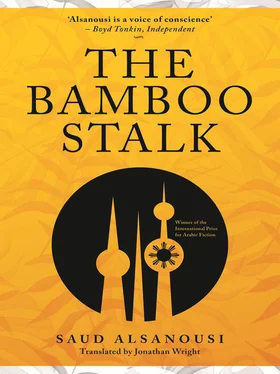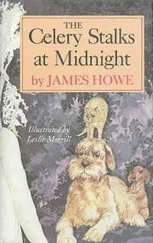What a choice I had — either a pineapple at Mendoza’s place or a banana exported to my father’s country.
2
When Cheng was asleep at night, I looked out at the Seng Guan Temple through the window of our room. It looked awesome, dark grey, with a tiled roof in the style of Chinese houses and with lots of decorative reliefs on the walls. There was a statue of a Chinese dragon and one of a bald old man with a smile on his face and a long beard. Above the arched doorway there was a plaque with an inscription in Chinese, and under that plaque, inside the arch, it said Seng Guan Temple in English. I loved the place and grew curious to find out what went on inside, but although I was curious I never thought of going into the temple.
Instead of visiting the temple, my curiosity led me to the shelves above Cheng’s fridge. I pulled out one of his books and from that night on I started reading by candlelight when he was asleep. I read the teachings of the Buddha, about his life and his disciples and how he sat in the lotus position under the fig tree, and the story of his enlightenment.
I found his personality fascinating. If I had stayed sitting under my favourite tree on Mendoza’s land, would I have become a Buddha , I wondered. Damn that relay tower.
Cheng noticed I was interested in his books, especially as I asked him many questions about his religion and the rituals. After that he started telling me about the Buddha every night and in return he would ask me about Jesus Christ. We compared them, noticed the similarities in how they were born and how they lived, their disciples and all the things that happened to them.
They were great men , I thought.
Would I be betraying one of them if I followed the teachings of the other?
Both of them advocate love and peace, tolerance, charity and treating other people well.
* * *
One day Cheng invited me to go to the temple with him. I hesitated at first, thinking it might not be allowed, but he assured me the temple let in Buddhists and non-Buddhists. ‘You’ll feel serene inside,’ he said.
Shortly before sunset, when we’d finished work, Cheng and I went to the temple. It was nothing like a church, but the feeling was the same.
‘Watch me, and do what I do,’ Cheng said, and when he realised I was confused, he added, ‘Or you can just sit there’, pointing to some red leather cushions on the ground. There were six rows of ten cushions side by side, each no more than a foot off the ground. I sat in the middle, on the fifth cushion in the fourth row. The light was low. In front of me there were three large glass enclosures with a life-sized golden statue of the Buddha in each one. In the middle enclosure the Buddha was standing upright surrounded by golden decoration in relief against a dark red background. In the other two enclosures the Buddha was sitting cross-legged.
Cheng and I were the only people in the temple. Cheng went up to the glass enclosure in the middle with his hands pressed together under his chin. He bowed his head and started to pray.
All my senses were on high alert. Many things can be discovered and experienced for free, as Merla said. I was impressed by everything: the incense smoke that hung in the air like a thick fog, the smell of jasmine flowers in all the corners. And the silence. Silence in itself can give rise to voices inside us that seem to be the voices of people that we feel we can trust. The voices show us the way to unfamiliar places and we hurry off confidently.
Cheng finished praying. He walked over to a large bronze bowl, lit an incense stick and stuck it in the soft sand in the bowl.
Before Cheng prepared to leave, I went up to the glass enclosure, leaving the red cushion behind me. I stood in front of the statue with the tranquil face. I bowed and made the sign of the cross. When I looked up, I found the expression on the Buddha’s face was just as tranquil, with no disapproval of what I had done.
I went to the bronze bowl, lit an incense stick and planted it in the soft sand. Then Cheng and I left together.
* * *
In the evening, after we’d spread our mattresses on the floor, Cheng sat cross-legged on his mattress. He rubbed his hands together like a fly. ‘Could you pass me the guzheng, please?’ he asked.
I went to the corner behind the door, where he left his instrument propped up against the wall. I picked it up carefully with both hands as if it were a child. It looked magical. It was made of ivory inlaid with tortoise shell. The twenty-one strings were carefully tuned. I passed it to him. He put it on his legs, then took off his shirt.
‘Are you going to breastfeed it?’ I asked him. He laughed at my joke.
‘I’m used to playing naked. If you weren’t here,’ he said.
I burst out laughing. ‘OK, OK, that’s quite far enough,’ I added.
He fixed little rings on his fingertips, with prongs like claws on them, and looked serious. ‘Before you sit down, José, switch that light off and light those candles on top of the fridge,’ he said.
I switched the main light off and lit the candles. And then. . but how can I convey here the sound that instrument made?
‘ Jasmine Fragrance ,’ said Cheng, referring to the piece he was about to play.
The fingers of his right hand strummed three strings at extraordinary speed, repeating the same chord, while the fingers of his other hand skipped from string to string, filling the room with magical music. The hair on the back of my neck stood on end and I felt my entire body respond to what I was hearing. I leaned back against the wall and closed my eyes. It was obvious that the instrument could make music. But how the strings produced the fragrance of jasmine, now that I can’t explain.
As soon as he’d finished plucking the strings he handed the guzheng back to me and pointed to the corner behind the door without saying a word.
‘What magic that instrument produces!’ I said as I put it back in its place. He smiled and didn’t say anything. He stuck his legs under the cover and lay on his mattress. I blew out the candles and lay on my mattress, waiting for him to start the usual bedtime conversation, but he didn’t speak.
‘Aren’t you going to chat tonight?’ I asked.
He adjusted his position, turning his back to me.
‘I just said everything I have to say. Everything,’ he said.
3
Late one night Cheng woke me up. ‘José!’ he said.
‘What’s up, Cheng?’
He was lying on his front on top of his mattress.
‘Heat up the oil and do your work,’ he said.
‘It’s nothing to laugh about,’ I replied angrily. ‘It was because of words like that that I left Mendoza’s land.’
Cheng tried to make amends. ‘I wasn’t joking. Didn’t you tell me you were willing to do the jobs your grandfather made you do, as long as it was somewhere else and you got paid for it?’
I sat up straight. ‘And will you pay me?’ I asked.
‘Don’t be stupid, José. Do your work first and I’ll tell you later.’
I gave in without understanding what he meant.
‘I need some oil,’ I said.
He pointed to the corner of the room. ‘On top of the shelf there.’
Within half an hour my massage had Cheng fast asleep.
‘Cheng! Cheng!’ I said, waking him up.
‘Tomorrow, José, please, tomorrow,’ he said, like someone who has been disturbed in mid-dream and doesn’t want to miss the rest of it.
I gave his shoulders a firm shake. ‘You’re not going to cheat me, Cheng, understand?’ I said angrily.
He sat up. ‘Selling bananas isn’t the right job for you, you idiot,’ he said, his eyes still half-closed.
‘It was my only option.’
‘Look, José,’ interrupted Cheng. ‘I’ll take you to the Chinese centre tomorrow morning, at the street corner behind the temple.’
Читать дальше












